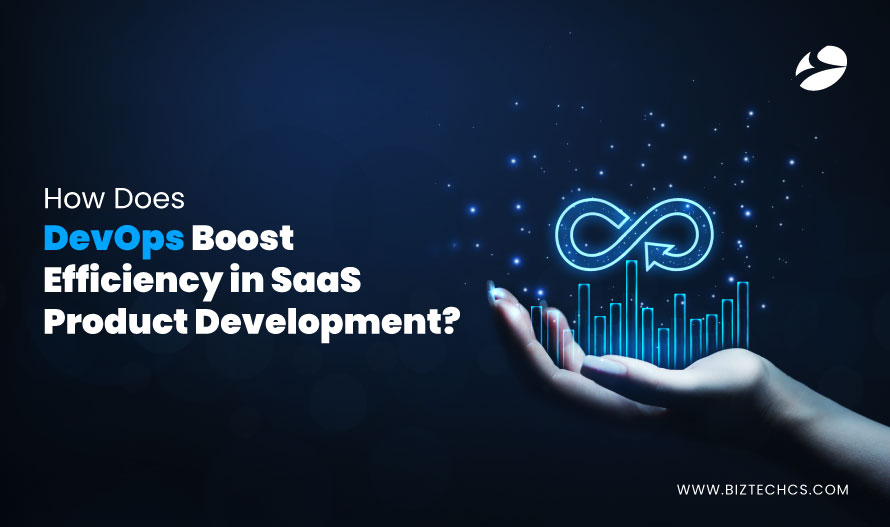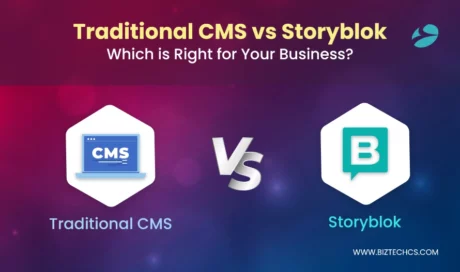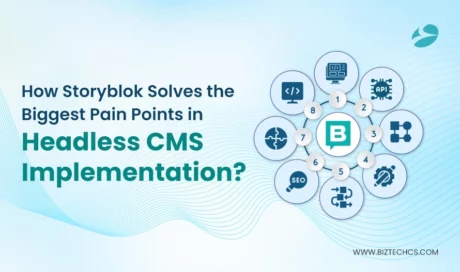799
How Does DevOps Boost Efficiency in Saas Product Development?
12 Feb, 2025
10 min read
799
12 Feb, 2025
10 min read
Table Of Content

A robust DevOps approach is necessary for developing scalable SaaS apps. Businesses require effective DevOps services as they expand to guarantee smooth deployment and performance.
With automation and cloud-native technology influencing contemporary workflows, DevOps is changing for the future. Software development service providers must incorporate DevOps best practices to manage rapid expansion.
DevOps prioritizes security, monitoring, and ongoing integration for SaaS systems to preserve stability. Organizations may meet client requests without interruptions when they use a well-structured approach.
Discover the top seven DevOps techniques necessary for creating scalable SaaS applications in 2025 in this blog.
A modern approach that combines development and operations teams is called DevOps. It improves cooperation, speeds up delivery, and automates processes to increase the productivity of software development services.
The capacity of DevOps to optimize deployment procedures, lowering errors and downtime, is one of its main advantages. Companies can accomplish faster updates and guarantee a flawless user experience using DevOps for SaaS apps.
Continuous integration and delivery support software scalability and dependability for DevOps for SaaS providers.
DevOps makes Continuous integration and deployment (CI/CD) possible, which is crucial to developing SaaS services. Automated pipelines minimize human error and effort by streamlining code integration, testing, and deployment.
This method improves the software development services’ agility by ensuring that users receive updates and new features promptly.
CI/CD enhances DevOps dependability for SaaS apps by reducing deployment failures and facilitating rollbacks.
Effective infrastructure management is essential for developing SaaS products, and DevOps uses Infrastructure as Code (IaC) to solve this problem.
Automating infrastructure provisioning using tools like Terraform, Ansible, and CloudFormation ensures consistency across environments.
DevOps’s scalability is a key advantage since it enables SaaS systems to modify resources in response to customer demand dynamically.
This automation enhances performance and cost-efficiency, making DevOps for SaaS necessary for businesses handling fluctuating workloads.
DevOps software development incorporates security directly to ensure adherence to laws like GDPR, HIPAA, and SOC 2. Access controls, vulnerability scanning, and automated security checks lower risks and improve data protection.
At every development process level, security precautions are enforced using DevSecOps principles. In developing SaaS applications, these proactive steps improve regulatory compliance and confidence.
Maintaining the performance of SaaS apps requires effective monitoring, and DevOps makes real-time observability possible.
Continuous system health tracking is made possible by tools like Prometheus, Grafana, and Datadog, which identify problems before they affect users. One of the most important aspects of DevOps for SaaS services is uptime, which is enhanced by automated alerting and repair.
By ensuring quick incident response, businesses enhance reliability and user satisfaction, reinforcing the benefits of DevOps in modern SaaS platforms.
DevOps for SaaS apps guarantees quicker and more dependable product releases through automation and continuous integration. CI/CD pipelines minimize errors and manual intervention by streamlining the deployment process.
This makes it possible for SaaS providers to more quickly and effectively push out updates, problem fixes, and new features.
Quicker deployment cycles increase software development services’ agility and guarantee that apps remain competitive in a changing market.
Infrastructure as Code (IaC) and cloud automation are two ways that DevOps maximizes scalability, which is a critical component in creating SaaS services.
By enabling dynamic scaling in response to traffic and resource demand, these procedures help to avoid performance problems during periods of high usage.
Additional resources are deployed when required and removed when demand declines thanks to automated provisioning. This efficiency maintains optimal performance and reduces unnecessary cloud infrastructure costs.
DevOps software development places a high premium on security, particularly for SaaS apps that handle private user information.
By incorporating security procedures into the development lifecycle, DevSecOps guarantees adherence to industry rules such as GDPR and HIPAA. Access controls, vulnerability assessments, and automated security checks reduce risks while preserving data integrity.
SaaS providers may safeguard user data and foster client trust by using proactive threat detection and compliance methods.
Automated testing and ongoing monitoring contribute to the reliability of SaaS applications. Early issue detection is emphasized by DevOps for SaaS services, enabling teams to address possible issues before they affect users.
Applications operate efficiently with little downtime thanks to real-time warnings and observability tools, which improve reliability.
These proactive measures improve uptime, resulting in a more stable and seamless experience for end users.
One of the main advantages of DevOps for SaaS firms is effective cloud resource management. By maximizing resource use, containerization technologies such as Docker and Kubernetes and automated infrastructure provisioning lower operating costs.
DevOps reduces needless expenses without sacrificing performance by eliminating pointless procedures and automating manual labor.
Over time, SaaS applications become more scalable and sustainable due to this economical method.
By dismantling conventional silos, DevOps encourages cooperation between development, operations, and security teams.
Teams can collaborate more effectively to fix problems and roll out updates by optimizing processes and enhancing communication. This cooperative strategy guarantees ongoing innovation in SaaS apps and speeds up software development services.
SaaS companies may produce high-quality solutions with faster time-to-market when teams have a common aim.
A key component of SaaS applications is improved user experiences resulting from a well-executed DevOps strategy.
Consistent performance enhancements, shorter downtime, and quicker deployments maintain client satisfaction and engagement. Dependable applications have greater retention rates because users are more inclined to stick with a product that fits their demands without any problems.
DevOps-driven SaaS solutions that prioritize responsiveness and stability enhance long-term profitability and customer loyalty.
Manual deployment, infrastructure management, and incident resolution procedures become sluggish and ineffective as a SaaS business grows.
These bottlenecks may cause reliability problems, raise operating expenses, and postpone product updates.
Automation brought about by DevOps for SaaS apps helps teams manage infrastructure more effectively and launch software more quickly.
By streamlining operations, companies can maintain stability, reduce downtime, and scale seamlessly.
Businesses that provide software development services must have a quick development cycle, particularly when implementing CI/CD techniques.
Frequent releases may result in problems, delays, and inconsistent deployments if they are not automated.
DevOps software development lowers the risk of errors by ensuring automated testing, version control, and deployment procedures. This method preserves quality and dependability while speeding up software delivery.
Security and compliance are crucial for developing SaaS services, particularly when managing sensitive user data. Time-consuming and prone to error, manual security checks increase risks.
By incorporating security into each development lifecycle phase, DevSecOps guarantees adherence to rules and industry standards. By being proactive, security risks are reduced, and user trust is increased.
Customer experience and retention are adversely affected by outages, performance problems, and unsuccessful installations.
Continuous monitoring, quick troubleshooting, and automated rollback procedures are all guaranteed by DevOps for SaaS to promptly resolve problems.
Businesses may fulfill consumer expectations, enhance performance, and provide dependable services with a robust infrastructure.
Beyond efficiency, DevOps has a direct positive impact on customer happiness and company expansion.
DevOps for SaaS applications is being revolutionized by AI-driven automation and AIOps, which makes real-time anomaly detection and predictive analytics possible.
Teams may minimize manual involvement, optimize cloud expenses, and automate infrastructure scaling by integrating AI and ML into DevOps software development.
By detecting performance bottlenecks before they affect users, AIOps improves system reliability. This proactive approach improves service uptime, making SaaS application development more efficient and resilient.
By treating infrastructure as code, GitOps is simplifying the administration of cloud infrastructure and guaranteeing consistency and dependability in DevOps for SaaS.
Git-based workflows allow developers to manage infrastructure, increasing the automation and repeatability of deployments.
Software development services are becoming more scalable because of the development of tools like Terraform and AWS CloudFormation, which can support complicated cloud setups.
The creation of SaaS apps benefits from this declarative approach’s reduction of human error and acceleration of release cycles.
Nowadays, DevOps for SaaS apps relies heavily on security-first DevOps, or DevSecOps, which integrates security throughout the CI/CD process.
Vulnerabilities are avoided before deployment with automated security scans, compliance checks, and policy enforcement.
Strict access controls are guaranteed via a zero-trust security approach, which lowers the risks connected to cloud-based infrastructures.
By shifting security left, teams can enhance protection while maintaining the speed and agility of DevOps software development.
We at BiztechCS are experts in developing SaaS applications, particularly on DevOps for SaaS solutions. Our group ensures scalability, security, and quicker deployments by streamlining DevOps software development.
Thanks to our extensive knowledge of DevOps for SaaS applications, we assist companies with workflow automation, resource optimization, and system reliability enhancements. Whether it’s optimizing operations across various industries or delivering finance industry solutions, we integrate the newest tools and technologies to tailor our software development services to specific business needs.
When you work with us, you can leverage our expertise to boost productivity, enhance performance, and drive continuous innovation in SaaS product development.
At last, a strategic approach to DevOps is needed in 2025 to construct scalable SaaS apps. Teams may improve performance and dependability by automating processes, putting microservices into place, and making the most of cloud resources.
Security, ongoing monitoring, and infrastructure as code further ensure resilience in a quickly changing digital environment. Cooperation between the development and operations teams is still essential for smooth deployment and effectiveness.
Businesses may scale their SaaS apps while preserving cost-effectiveness, agility, and security by implementing these DevOps techniques.
DevOps in SaaS development is a set of practices that combine software development and IT operations to improve collaboration, automation, and deployment speed. It ensures seamless software updates, scalability, and reliability in cloud-based applications.
DevOps streamlines deployment, reduces downtime, and enhances performance, ensuring a stable and efficient SaaS product. It also enables faster feature releases, security improvements, and better user experience.
Popular DevOps tools for SaaS include Jenkins for CI/CD, Kubernetes for container orchestration, and Terraform for infrastructure automation. Other essential tools include Docker, GitLab, Prometheus, and Ansible.
CI/CD automates code integration, testing, and deployment, reducing manual errors and accelerating software releases. It ensures that updates reach users faster while maintaining system stability and reliability.
DevOps for SaaS involves integrating development, operations, and security to enhance software delivery and system performance. It focuses on automation, monitoring, and scalability to support continuous improvements.
DevOps improves compliance, security, and uptime, which are critical in financial services. It also enables faster feature rollouts, reduces risks, and enhances data protection through automated monitoring and incident response.
Custom software solutions cater to specific financial needs like risk management, regulatory compliance, and customer analytics. They provide better security, seamless integrations, and improved operational efficiency.
Look for engineers with experience in cloud platforms, CI/CD, security, and automation tools. Assess their problem-solving skills, hands-on expertise, and ability to work in agile environments.
The best company depends on your specific needs, but leading firms specialize in security, compliance, and automation for financial applications. Look for a provider with experience in regulated industries, cloud-native solutions, and 24/7 support.

Storyblok
23834
By Devik Gondaliya
02 Apr, 2025

Storyblok
24804
By Devik Gondaliya
01 Apr, 2025

Storyblok
25524
By Devik Gondaliya
27 Mar, 2025